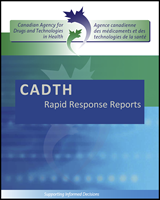Mindfulness is an integrative, mind-body based approach that helps people change the way they think and feel about their experiences. It is a way of paying attention to the present moment by using meditation, breathing techniques, and yoga. Mindfulness involves consciously bringing awareness to thoughts and feelings, without making judgments , allowing the individual to become less enmeshed and better able to manage them. The objective of this review is to summarize the clinical effectiveness and guidelines for the use of mindfulness interventions for the treatment of post-traumatic stress disorder (PTSD), generalized anxiety disorder (GAD), depression, and substance use disorders in adults.
Disclaimer: The Rapid Response Service is an information service for those involved in planning and providing health care in Canada. Rapid responses are based on a limited literature search and are not comprehensive, systematic reviews. The intent is to provide a list of sources of the best evidence on the topic that CADTH could identify using all reasonable efforts within the time allowed. Rapid responses should be considered along with other types of information and health care considerations. The information included in this response is not intended to replace professional medical advice, nor should it be construed as a recommendation for or against the use of a particular health technology. Readers are also cautioned that a lack of good quality evidence does not necessarily mean a lack of effectiveness particularly in the case of new and emerging health technologies, for which little information can be found, but which may in future prove to be effective. While CADTH has taken care in the preparation of the report to ensure that its contents are accurate, complete and up to date, CADTH does not make any guarantee to that effect. CADTH is not liable for any loss or damages resulting from use of the information in the report.

